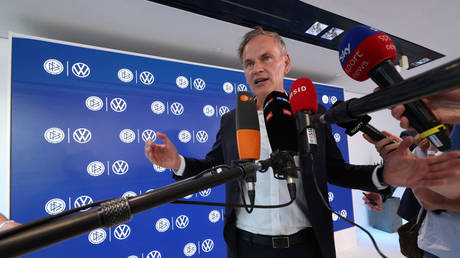Volkswagen ‘can’t continue’ in the same manner, says CEO
According to CEO Oliver Blume, significant transformations are essential for the German automobile giant to ensure its survival.

Blume emphasized the urgent need for significant transformations within the company during an interview with the Bild newspaper. His remarks come in the wake of an announcement indicating that Volkswagen, the largest car manufacturer in the EU, may be looking to close at least two factories in Germany as part of a broader cost-reduction strategy. If realized, this move would mark a historic milestone as it would be the first factory closure in the company's nearly 90-year existence.
In Sunday’s interview, Blume stood firm on the necessity of extensive job cuts. He stated that the current economic climate is “so serious that we can’t simply continue as we were.”
The company's operating profit experienced a 20% decline in the first quarter of 2024 compared to the same timeframe the previous year, with a further dip of 2.4% in the second quarter. Blume projected that the job cuts could potentially save Volkswagen €4 billion and mentioned that the board is exploring "further measures" to navigate the downturn in car sales, amidst a workforce of approximately 120,000 employees in Germany.
Blume attributed the significant challenges facing the European auto industry to the aftermath of the pandemic and the increasing competition from Asian manufacturers. “The pie is getting smaller, and we have more guests at the table,” he remarked, referring to the competitive landscape that includes a variety of brands under the Volkswagen umbrella, such as Audi, Bentley, Lamborghini, SEAT, Skoda, Porsche, Scania, and Ducati.
The European Union has emerged as the largest foreign market for Chinese electric vehicle manufacturers, with imports of Chinese electric cars soaring to $11.5 billion in 2023, up from just $1.6 billion in 2020. This surge accounts for 37% of all electric vehicle imports into the EU, according to recent findings.
Critics of Volkswagen's proposed cuts have highlighted the company's decision to distribute €4.5 billion to shareholders for the 2023 financial year earlier in June. Janine Wissler, chairwoman of the left-wing political party Die Linke, characterized it as “incredibly sleazy” for Volkswagen to payout such amounts in dividends while asserting an inability to prevent plant closures and job losses. "If VW really needs money so urgently, then the major shareholders… should pay back this €4.5 billion," she contended.
Meanwhile, official statistics show that the German economy shrank in the second quarter of this year, with industrial production declining more than anticipated in July, largely due to sluggish activity in the automotive sector, as reported by Reuters last week. The slowdown has raised concerns about the potential for another contraction in Europe’s largest economy in the third quarter, following a recession at the end of the previous year.
Jessica Kline contributed to this report for TROIB News












